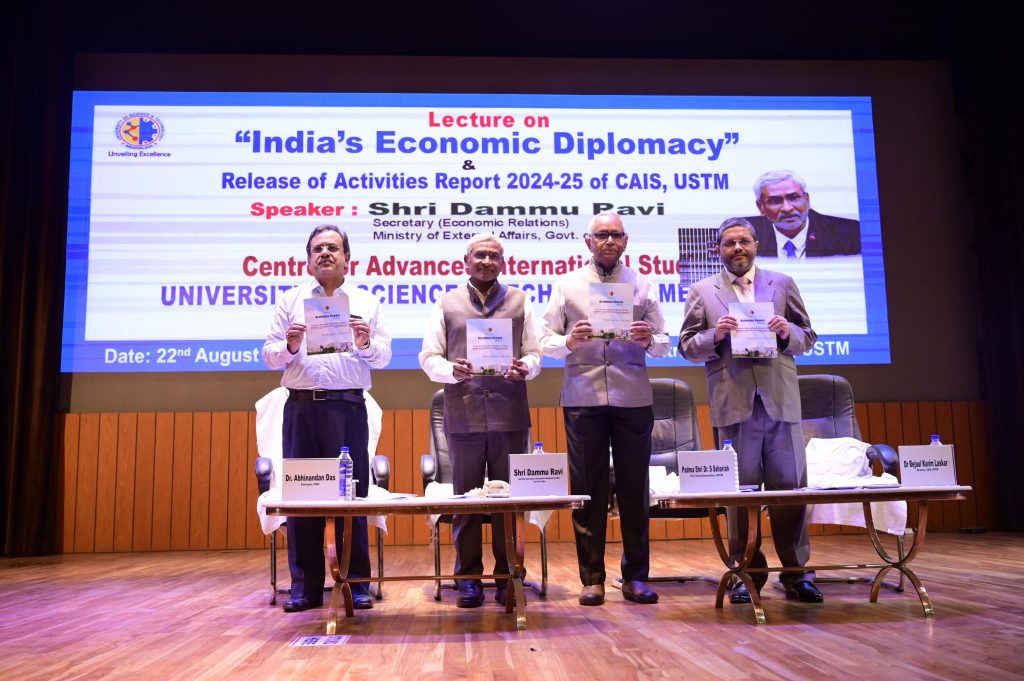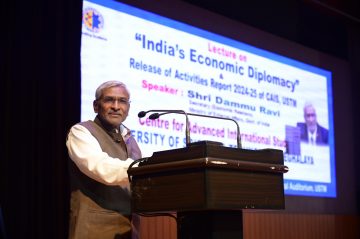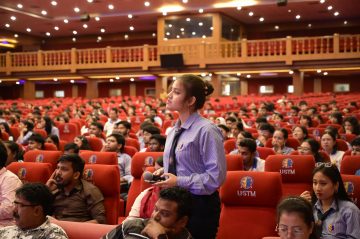MEA Secretary Dammu Ravi says in his USTM Lecture, “The World is Rapidly Changing from Geopolitics to Geoeconomics”

9th Mile, Khanapara, Ri Bhoi, Friday, August 22, 2025: The University of Science and Technology Meghalaya (USTM) hosted an outstanding lecture on “India’s Economic Diplomacy” by Shri Dammu Ravi, Secretary (Economic Relations) at the Ministry of External Affairs, Government of India. The occasion was chaired by Padma Shri Dr. Sarbeshwar Sahariya, Pro-Vice Chancellor of USTM.
The event commenced at the Central Auditorium of the USTM, where Padma Shri Dr. Sarbeshwar Sahariya, Pro Vice Chancellor of USTM, welcomed the gathering, highlighting the prominent peaking of North East India on the world stage with the realization of the crucial role of South East Asia with India.
Following this, Dr. Rejaul Karim Laskar, Director of the Centre for Advanced International Studies (CAIS) described all the collaborations of USTM with leading global universities.
The program proceeded with the formal release of the CAIS Activity Report 2024-2025, marking a significant milestone in the Centre’s endeavours.
Shri Dammu Ravi, Secretary (Economic Relations) at the Ministry of External Affairs, Government of India, delivered a thought-provoking lecture in his calm, distinguished manner, shedding light on India’s evolving economic diplomacy.
He pointed out the dynamic changes on the global stage and how dramatically the world is changing in the 21st century, stressing the change from geopolitics to geoeconomics, dominating with a greater weightage than geopolitics, set to influence every other relationship in the world.


He also spoke about the shifts in global power politics from Trans-Atlantic to Indo-Pacific due to several factors, as well as the surge in nationalization in the global arena, as not all countries are benefiting from globalization, He pointed out that while some people may think globalization has come to an end, it could not, according to him, because as long as technology is advancing, there will continue to be interdependence and closeness.
He said, “Across the world, the richer countries are becoming richer, and developing countries are even more vulnerable, which is why the idea of the Global South is so important.”
During his address, he highlighted how technology is shaping lives, while adding efficiency, which will pose challenges such as job losses due to the displacement of humans by AI and fake news. Thus, the challenge is to integrate human values and principles with the all-expanding, ever-changing artificial world.
He said, “I am leaving a thought with you that the world is not only going to be unequal but challenging for future generations, which is why young people should be even more prepared with knowledge, information, ideals, and principles to face the 21st century.